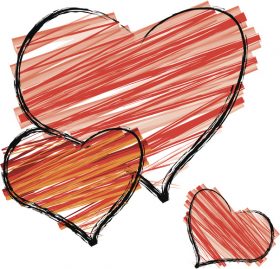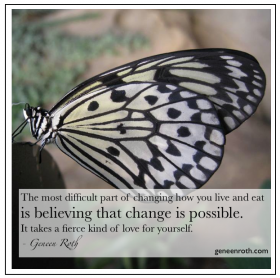Love, Loss and What I Ate
Enjoy this article from the archives:
When I was a child, I loved my father so much that I was convinced that when he died, I would die. Even after I got married, I continued to believe that my father was the one person who loved me unconditionally, and that without him, love would disappear. When he was diagnosed with stage 4 lymphoma, I was devastated. And I was faced with a dilemma: I could bury myself in food, or I could actually let my heart break--the way it was already breaking--and see if I could survive what I never thought I could.
Recently, I worked with a retreat student struggling with the same conflict. Six months after the unexpected death of her 30-year-old husband, she had a 32 pound weight gain. She said she couldn't stop eating because if she stopped eating, she'd start crying, and if she started crying, she'd never stop. She believed, as I once did, that if she let herself feel the depth of her emotions, her sorrow, she would break like an antique porcelain doll and never be whole again.
When I asked if she had ever felt anything that had never ended, she said no. When I asked if the 32 pound weight gain was lessening the grief, she said no. "Now," she said, "I am grieving about two things: my husband and my weight.”
So I asked if she would be willing, with my support, to allow herself to cry for exactly 4 minutes and see what happened. She was. I set my stopwatch. Three minutes and 45 seconds later, she stopped crying. "Oh my God," she said, "there was an end. Maybe just a temporary end, but still, an end." She began to understand then that emotional eating was, paradoxically, a way to both bury and extend her grief: If she kept eating, she'd never have to actually feel her grief. And if she were fat, then she'd never feel attractive enough to get involved with any other man. That way she could always stay loyal to -- and grieving for -- her husband.
Many of us believe that if we let ourselves experience our emotions, we will shatter. We will never get out of bed, go to the bank, or feed our kids. But in my own life and in my work with thousands of people struggling with weight issues, I have discovered that none of that is true. Most of the time, feelings don't break us. No matter how terrible something is -- even the death of someone we love -- what damages us, makes us brittle, and turns us toward food is avoiding the emotions and not allowing them to surface. It is fear of emotions that is at the root of emotional eating, not the emotions themselves.
Try this experiment: Become aware of what you are feeling at this moment. Notice how it affects you to be paying even this much attention to a feeling. To give it space. To be curious about it. To be treating yourself kindly. If you're like most people, you're starving not for food, but for attention -- your own attention. Just spending a minute or two with yourself, noticing which emotions want to be heard and how they affect you, is a great way to begin feeding those parts of yourself that are starving to be noticed. Eventually, you'll learn that you can let yourself feel what's there instead of stuffing it down with food. And you'll see that you come out on the other side with more of yourself, not less.
A Zen teacher once told me that we come into this life to lose everything we love, including our own bodies. I didn't like him very much after he said that. I wanted to argue with him and insist that surely there is a way around loss, heartbreak, and death. And at one time in my life, there seemed to be: Emotional eating creates a major distraction and bypasses the rawness of being alive. Eating helps numb the pain -- but if you don't allow yourself to experience your own feelings, you will be sleep-walking through your life.
My book, The Craggy Hole in My Heart and the Cat Who Fixed It, is about loving and losing my father and another great love of my life, my cat Blanche. Since I am telling the truth here, I will admit that as they were dying, I had a few minor episodes of retail therapy, and ate a little more chocolate than usual. But mostly, I cried. And in the end, I was incredibly grateful for their lives -- and for this whole messy, glorious existence (as well as that fabulous pair of earrings I bought across the street from the hospital where my father received chemotherapy).
What does loving and losing a dad and a cat have to do with emotional eating? Everything. Because it's not just the biggest losses we try to avoid by eating. It's also the everyday deaths -- the disappointments, the illnesses, the rejections, the hurt we feel when life does not turn out the way we'd hoped. Once we realize that we will survive the sadness and hurt, we don't have to deaden ourselves with food. And we can discover that our tender, vulnerable hearts are bigger and more resilient than we ever imagined.
___
If you enjoyed reading this article, we invite you to Join Geneen at her fall retreat -- November 5-10, at Mount Madonna Center in Watsonville, CA.
No matter how sophisticated, wise, or enlightened you believe you are, how you eat tells all. If you want to understand and change your beliefs about abundance, scarcity, deprivation, relaxation, kindness, and what you deserve to give yourself, the world is on your plate.
During this retreat, Geneen reveals how to identify the positive and often unconscious reasons why you keep the weight struggle alive. You'll learn precise and intuitive steps to channel the obsession with food, body and weight in a life-affirming way. Be fierce about what you want and what you love. Make your reservation today. Click here for more information or call 1-703-401-0871 today.









